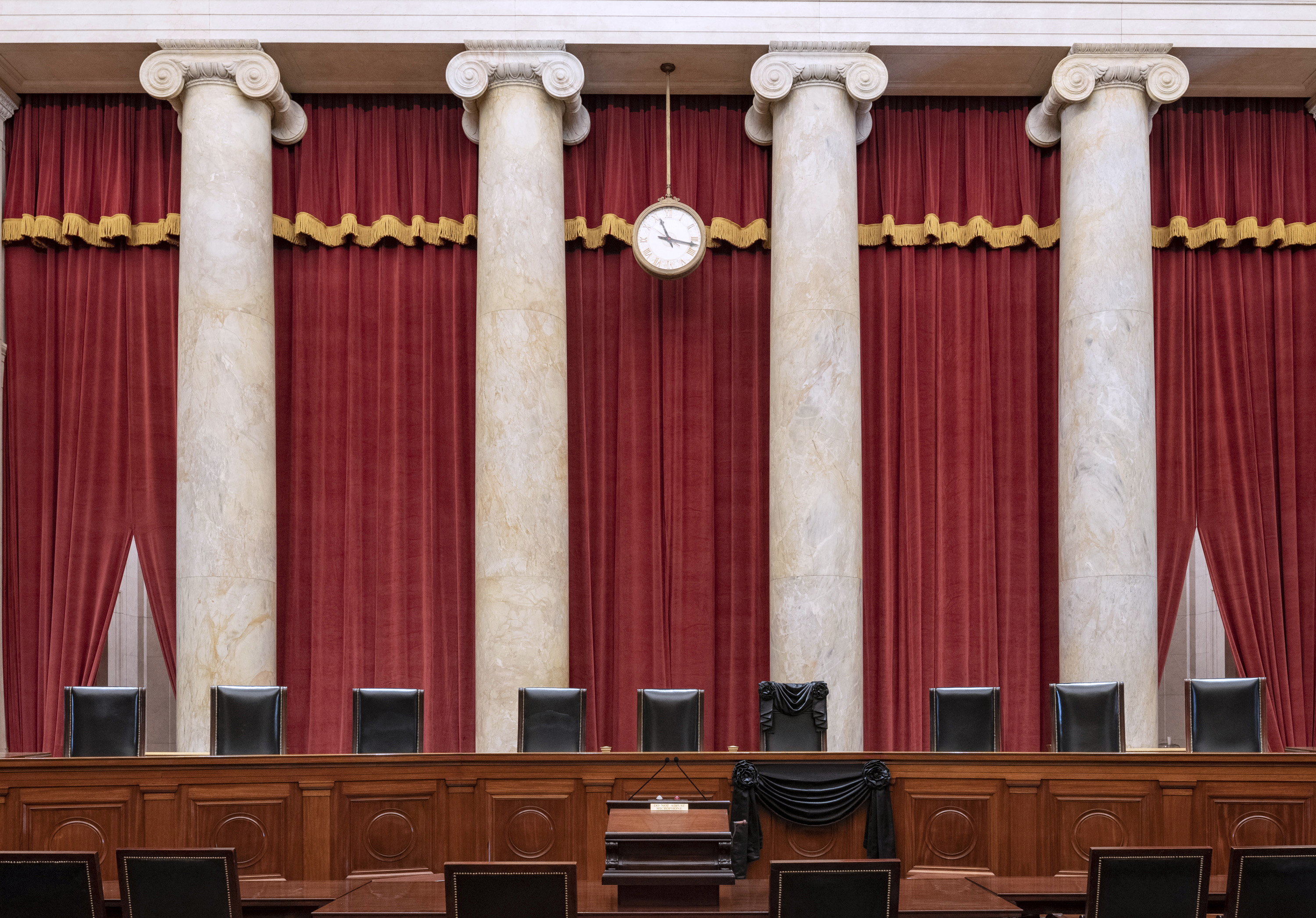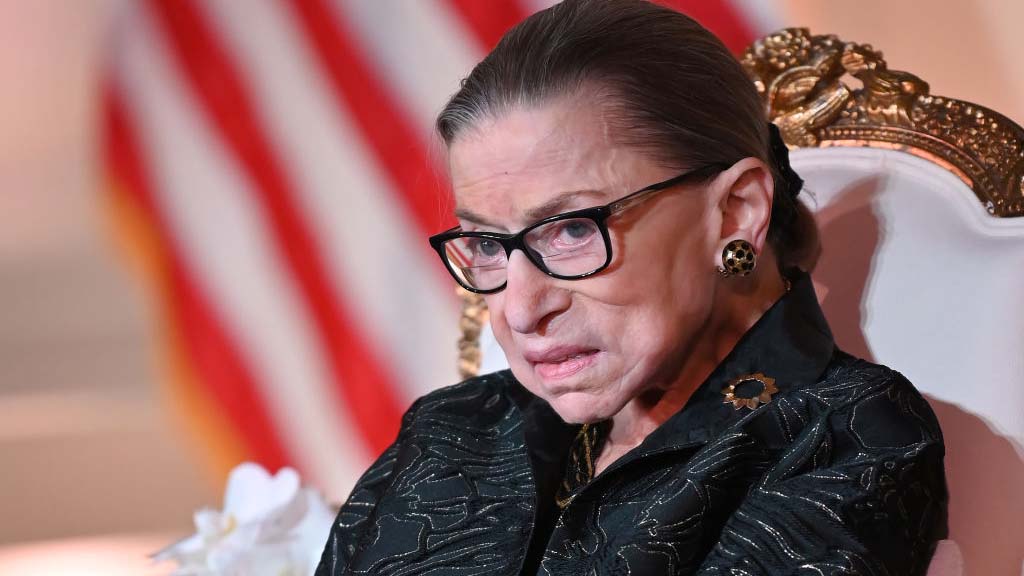President Donald Trump has said he would nominate a woman to replace Justice Ruth Bader Ginsburg, who died Friday at the age of 87 and was a champion of gender equality. Here is a look at the top contenders.
AMY CONEY BARRETT
Barrett, 48, is widely considered to be the front-runner. She was previously considered as a finalist for Trump’s second nomination to the high court, which eventually went to Justice Brett Kavanaugh. A devout Catholic mother of seven, she is a favorite of religious conservatives and considered a strong opponent of abortion.
Barrett was nominated by Trump to the U.S. Court of Appeals for the 7th Circuit and confirmed by the Senate in October 2017 by a 55-43 vote. The 7th Circuit, based in Chicago, covers the states of Illinois, Indiana and Wisconsin.
Get top local stories in Connecticut delivered to you every morning. >Sign up for NBC Connecticut's News Headlines newsletter.
In her nearly three years on the bench, Barrett’s judicial record includes the authorship of around 100 opinions and several telling dissents in which Barrett displayed her clear and consistent conservative bent.
Barrett served as a law clerk to Supreme Court Justice Antonin Scalia. She worked briefly as a lawyer in private practice in Washington, D.C., before returning to the University of Notre Dame Law School, her alma mater, to become a professor in 2002.
During her Senate confirmation hearing for the appeals court in 2017, Democrats pressed Barrett on whether her strong religious views would impact her potential rulings on abortion and other hot-button social issues.
Barrett responded that she takes he Catholic faith seriously, but said that “I would stress that my personal church affiliation or my religious belief would not bear in the discharge of my duties as a judge.”
She is married to Jesse Barrett, a former federal prosecutor who is a partner at a law firm in South Bend, Indiana. The couple have seven children, included two adopted from Haiti and one child with special needs.
BARBARA LAGOA
Lagoa, 52, is a Cuban American judge from Florida who was nominated by Trump to serve on the 11th Circuit Court of Appeals in 2019. Her name was on the White House’s list of potential high court contenders released earlier this month.
Raised in the heavily Latino Miami suburb of Hialeah, Lagoa is the daughter of Cuban exiles who fled the communist regime of Fidel Castro. She speaks fluent Spanish and has a solidly conservative judicial record. Lagoa’s potential nomination is being touted as a way for Trump to shore up flagging support in a crucial battleground state where recent polls have shown Democratic presidential nominee Joe Biden with a narrow lead.
Lagoa also has the potential benefit of having been previously vetted by the Senate just 10 months ago, sailing to confirmation by a wide margin of 80-15 in a relatively rare bipartisan vote in November. The 11th Circuit covers Georgia, Florida and Alabama.
On Saturday, Trump said he had not yet met Lagoa but that “she’s Hispanic and highly respected.”
Lagoa is a graduate of Florida International University and went on the earn her law degree from Columbia University in New York in 1992. She then worked in private practice in Miami for about a decade.
In 2000, Lagoa gained notoriety as part of the legal team that represented relatives of Elián González, the young boy caught in a high-profile custody dispute between his father in Cuba and family members in Miami.
Lagoa is married to Paul Huck Jr., a Miami attorney. The couple have three children.
JOAN LARSEN
Larsen, 51, was a little-known University of Michigan legal scholar until 2015, when then- Gov. Rick Snyder, a Republican, tapped her to fill a vacant seat on the Michigan Supreme Court.
The following year, "Justice Joan" campaigned to fill the remaining term of her predecessor on the court by appealing to conservative voters, promoting an originalist interpretation of legal texts and pledging not to “legislate from the bench.” As a presidential candidate Trump included Larsen’s name on his first list of potential nominees to the nation’s highest court.
Trump carried Michigan that November and after becoming president quickly sought to elevate Larsen to the federal bench, tapping her in May 2017 to fill a vacant seat on the Cincinnati-based 6th Circuit Court of Appeals. Michigan’s two Democratic U.S. senators initially held up her appointment since the White House hadn’t consulted them on the nomination, as is customary. But after meeting with the senators, Larsen was confirmed by the Senate by a 60-38 vote the following November.
Larsen grew up in Waterloo, Iowa, and graduated from the University of Northern Iowa before going to Northwestern University School of Law in Chicago. After graduating in 1993, Larsen landed a coveted clerkship with Justice Antonin Scalia.
Following the election for President George W. Bush, she joined the Office of Legal Counsel in the U.S. Department of Justice, where she authored a still-secret 2002 memo that addressed detainees’ rights to challenge their detention.
Returning to teach law at Michigan, Larsen championed an expansive view of the powers of the presidency. She wrote a 2006 article defending Bush’s use of signing statements to interpret laws passed by Congress. At her 2017 confirmation hearing for the federal bench, however, Larsen assured senators she would have no problem ruling against Trump if the law demanded it.
Larsen is married to Michigan law professor Adam Pritchard, an expert on corporate and securities law. They live in Scio Township near Ann Arbor and have two children.
ALLISON JONES RUSHING
Rushing, 38, was confirmed just 18 months ago to the 4th U.S. Circuit Court of Appeals in Richmond. If elevated to the Supreme Court, she would be the youngest justice confirmed since the early 1800s.
She is a native of Hendersonville, North Carolina. Her potential selection is being championed within the White House by chief of staff Mark Meadows, who also hails from the mountains of the Tarheel State.
Rushing graduated from Wake Forest University before attending Duke University, where she earned her law degree in 2007. She then clerked for future Justice Neil Gorsuch, who was then an appeals court judge, as well as at the Supreme Court for Justice Clarence Thomas.
As an appellate specialist while in private practice at the Williams & Connolly law firm in Washington, Rushing filed scores of briefs with the Supreme Court. But her comparatively short legal career included prior work with a conservative Christian legal group that is sure to stoke Democrats and their allies to fight her nomination.
While in law school in 2005, Rushing interned at Alliance Defending Freedom, a group known for its opposition to same-sex marriage and expanded rights for transgender people. That has led Democrats to cast Rushing as an “a young, ideological extremist.”
Rushing is married to Blake Rushing. The couple have a young son.
KATE COMERFORD TODD
Todd, 45, is the only lawyer on Trump’s potential shortlist for the Supreme Court who has never served as a judge.
A deputy White House counsel, her close connection to the Trump administration could give an opening to Democrats to attack her independence and relative lack of experience. However, her lack of a judicial record also leaves little paper trail for opponents to sort through for material to attack.
Todd graduated from Cornell University before attending Harvard Law School. She then clerked for Thomas at the Supreme Court. She worked in private practice before serving as the senior vice president and chief counsel for the U.S. Chamber Litigation Center, which is the legal arm of the U.S. Chamber of Commerce.
Todd is married to Gordon Dwyer Todd, a partner at Sidley law firm in Washington specializing in white-collar defense and government litigation. The couple live in Northern Virginia with their four children.



